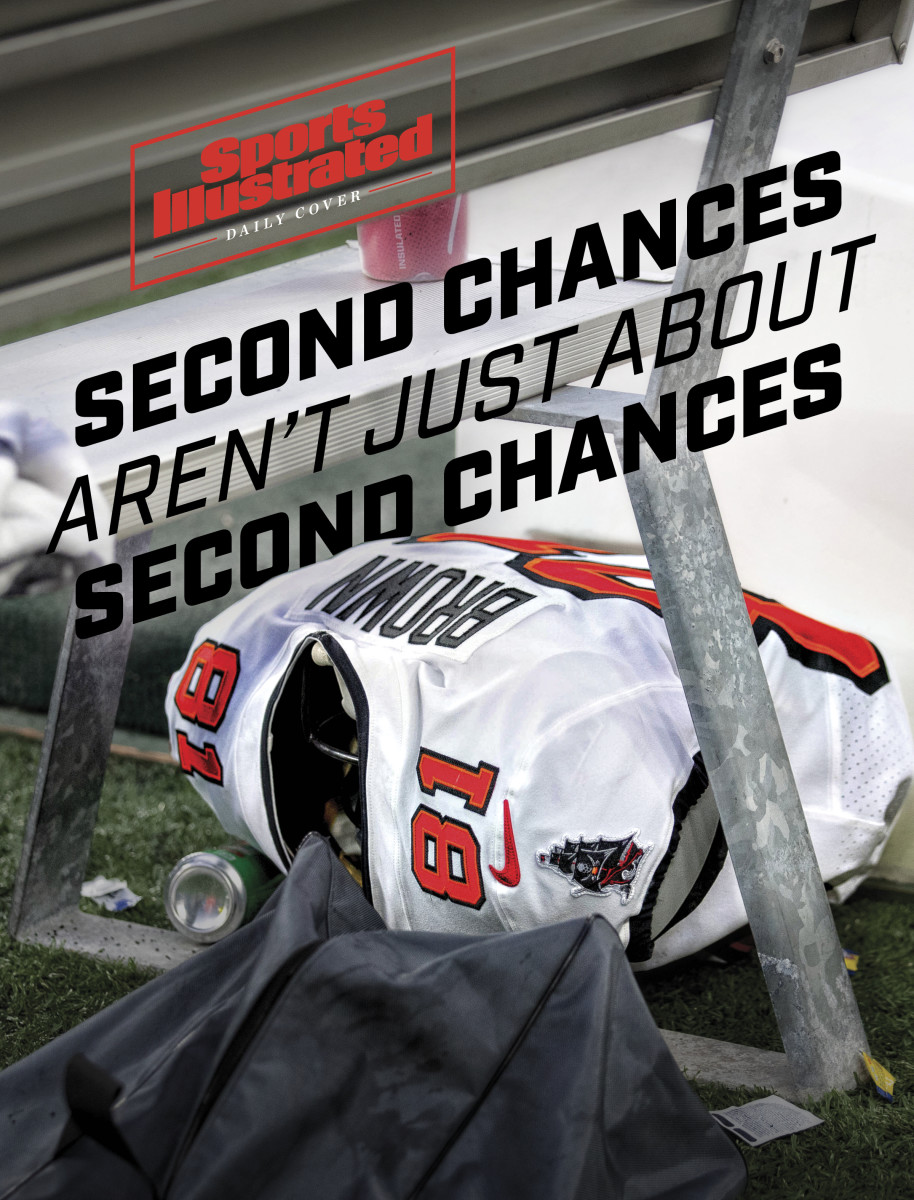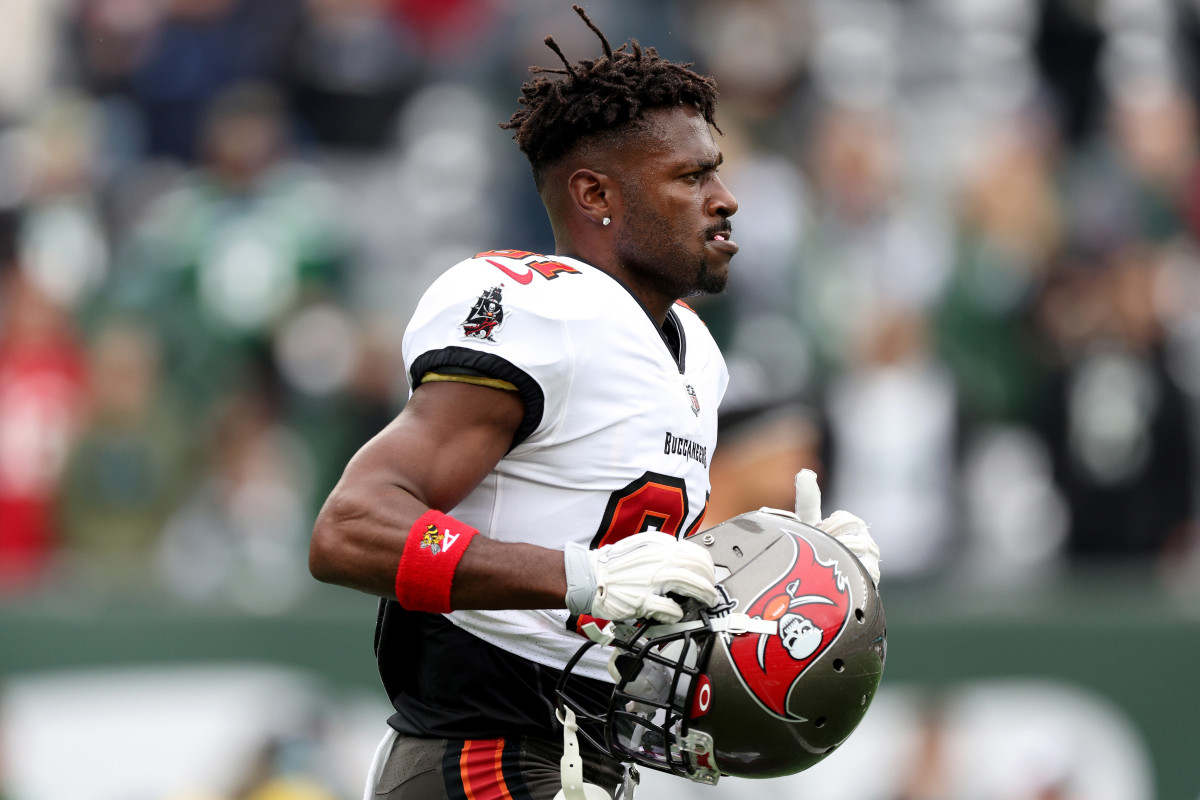There Was Never Any Redemption Story in Antonio Brown
Antonio Brown’s walk-off strip show was a bizarre but appropriate ending to his Buccaneers tenure. Removing his jersey was the only way to get the Bucs to see him for what he really is.
For two years, the Bucs sold us the fallacy that athletic success is a reflection of character and that Brown’s performance meant he had made personal progress. The two most important people in the organization, Tom Brady and Bruce Arians, both peddled that nonsense at times. The reality is that when the Bucs signed Brown, he was a great football player with a recent history of damaging and destructive behavior. For the entire time he played for them, he was a great football player with a recent history of damaging and destructive behavior. That’s not progress. The Bucs just reinforced that, as long as he was a great football player, the recent history of damaging and destructive behavior did not matter.

Teams throughout sports should take a hard look at what happened in Tampa. It is a prime example of what happens when, consciously or subconsciously, teams view people through the prism of what they do on the field. In 15 games as a Buc, Brown caught 87 passes for 1,008 yards and eight touchdowns. That success added fuel to the illusion that Tampa Bay was right about him. In fact, every catch just pushed him closer to an implosion, because it tilted the dynamics of the relationship. In the beginning, Brown needed the Bucs. The better he played, the more he believed the Bucs needed him.
Brown stopped being a great football player Sunday. That is when Brady said, “I think everybody should do what they can to help him in ways that he really needs it.” That is a lovely sentiment, and Brady seemed genuine when he said it. But Brady and the Bucs seemed to convince themselves that playing football helped Brown, when it really just allowed him to ignore his serious problems. Sure, he had been accused of all sorts of misconduct. But he was still a productive football player. The rest was just—Brown actually and repeatedly used this word—“drama.”
The Bucs got what they deserved for signing Brown. But they also got what they created. Second chances (and Brown was on his fourth) are not just about second chances. The opportunity is just the beginning. People need to be honest about their failures and own them every day until owning them is essential to their existence. The Bucs never really tried that. Instead, in October 2020, Arians told NBC Sports’s Peter King, “He screws up one time, he’s gone,” regarding his new star, which sounded great but was really just ridiculously shallow thinking. Brown has real problems. Saying, “Don’t do that again!” was no way to help him address them.
This year, when Brown was suspended for three games for procuring a fake COVID-19 vaccine card, Arians was asked about that zero-tolerance policy. His answer there was just as weak.
“I could give a s--- what [people] think,” Arians said. “The only thing I care about is this football team and what’s best for us.”
This was a classic Fake Tough Guy football-coach rant: cowardice cloaked in hubris. It was just Arians’s way of intimidating anybody who dare question him, and, by going that route, Arians implicitly dismissed the legitimacy of the questions.
There were so many more mature ways for him to respond. He could have said the questions were fair but he had changed his mind. He could have said he believed in zero tolerance when Brown was signed but the more he thought about it, the more he realized he should not have taken such an absolutist stance. He could have said that in his mind, obtaining a fake vaccine card did not rise to the level of dismissal, especially since Brown did get vaccinated.
Arians did say, “Well, the history has changed since that statement. A lot of things went on last year that I was very proud of him.” But that got lost in his dismissal of critics, and anyway, Arians didn’t really say what “went on last year.”
I think he meant that the Bucs won the Super Bowl.

That was all that really happened. There was never any indication that Brown had learned from his transgressions. He did not publicly own up to his mistakes. In January 2020, when he was still unsigned, he told ESPN, “I feel like I never really got in a conflict with no woman. I just feel like I’m a target so, anybody can come against me and say anything [that] I have to face. There’s no support, there’s no egos, there’s no rules in it, anyone can come after me for anything. No proof or whatever. ‘He said, she’s saying.’ ” Given numerous chances during his mandatory media availability before the Super Bowl, all Brown could muster was, “I’ve been through some things, but that’s life.” He never detailed what he did, or apologized to many he wronged. He didn’t even seem to change his behavior. He repeatedly dismissed anybody who questioned him by saying he just wanted to focus on football. He did this time and time again, most recently when he came back from his suspension and dismissed reporters who just wanted to create “drama.”
It was searingly obvious that Brown saw the sum of his transgressions not as mistakes he made, but as stuff that happened to him. There was never any redemption story here. This was not about personal growth. It was a simple story of the Bucs squeezing considerable production out of a man who had not changed.
And who wanted that more than anybody? Tom Brady.
Brady was the main reason Brown was in the league at all. After Brady signed with the Bucs, Arians publicly dismissed the idea of Brown joining the team. But Brady wanted him, and Brady got him.
Brady seems to genuinely believe that he knows better ways for most people to live, and he seemed to think he could help Brown. But he, as much as anybody in football, enabled Antonio Brown. That is surely not how Brady saw it at the time. But if he sits back and reflects, and his love for Brown is sincere, then hopefully he can see it now.
There are ways to help troubled people reenter their chosen profession. What the Bucs tried was a shortcut from the beginning. It worked on the field, but only on the field.
This is probably the end for Brown’s NFL career. He played on a level worthy of the Pro Football Hall of Fame, but maybe he should start his own museum instead. On one wall, he can frame the jersey he ripped off in the middle of his team’s game Sunday. On another, he can hang the outdated helmet he insisted on wearing with the Raiders. On a screen, he can show his unauthorized Facebook Live stream from the Steelers’ locker room. He can also frame the stats he piled up, the bills he refused to pay and the lawsuits that were filed against him, quotes from the women he mistreated, and executives from every NFL team can walk inside and see who learns a damn thing.
• MMQB: The Bengals Deliver as the Playoff Picture Takes Shape
• How the Supply-Chain Crisis Led to a Pylon Shortage
• A Quarterback Evolution and a Coaching Revolution
• The Problems With the Deshaun Watson Investigation
